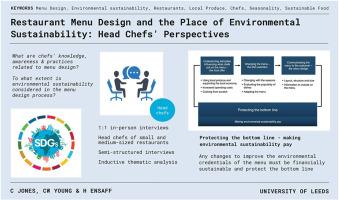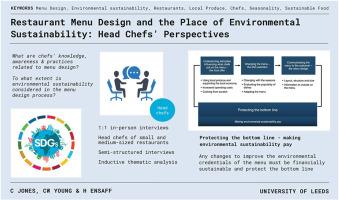餐厅菜单设计和环境可持续性:主厨的观点
IF 10
1区 环境科学与生态学
Q1 ENGINEERING, ENVIRONMENTAL
引用次数: 0
摘要
人们呼吁餐馆支持全球可持续发展目标,改善其环境绩效。劳动力短缺和运营成本的持续挑战也强调了实现企业财务目标的可持续实践的必要性。本研究旨在更好地了解厨师在菜单设计方面的知识、意识和实践,以及环境可持续性在多大程度上被考虑并影响菜单设计过程。对15位来自英格兰北部中小型餐馆的厨师进行了面对面的个人访谈。讨论被记录、转录并导入NVivo 14,其中采用归纳主题方法,并提供了三个主题:1)影响厨师在菜单上放什么的基本原则,2)改变菜单,3)向客户传达菜单。在这项研究中,厨师们优先选择时令农产品,使用新鲜的食材从零开始烹饪,并购买支持当地经济的当地食物。这项研究还揭示了厨师们如何更喜欢设计简洁明了的菜单,并通过监测菜肴的受欢迎程度,以及重新利用、保存或利用食材的所有部分,来最大限度地减少食物浪费。调查结果强调了厨师决定在菜单上放什么食物是如何受到农产品成本和可用性、运营成本和商业资源的影响的。因此,任何改善菜单环境证书的改变都必须在财务上可持续,并保护底线。本文章由计算机程序翻译,如有差异,请以英文原文为准。


Restaurant menu design and the place of environmental sustainability: Head chefs’ perspectives
There are calls for restaurants to support the global sustainable development goals and improve their environmental performance. The ongoing challenges of labour shortages and operating costs also underline the need for sustainable practices to fulfil the financial objectives of businesses. This study aimed to gain a better understanding of chefs’ knowledge, awareness and practices related to menu design and the extent to which environmental sustainability is considered and influences the menu design process. Individual interviews were conducted face-to-face with fifteen chefs of small-and-medium sized restaurants in Northern England. Discussions were recorded, transcribed, imported into NVivo 14, where an inductive thematic approach was employed and provided three themes: 1) Underpinning principles influencing what chefs put on the menu, 2) Changing the menu, and 3) Communicating the menu to the customer. In this study, chefs prioritised seasonal produce, cooking from scratch using fresh ingredients, and buying local food which supports local economies. This study also revealed how chefs preferred to design small and agile menus with clear and concise dish descriptors, and recognised the importance of minimising food waste by monitoring the popularity of dishes, as well as repurposing, preserving or utilising all parts of an ingredient. Findings emphasise how chef decisions about what food to put on the menu are influenced by produce cost and availability, operating costs, and business resources. Therefore, any changes to improve the environmental credentials of the menu must be financially sustainable and protect the bottom line.
求助全文
通过发布文献求助,成功后即可免费获取论文全文。
去求助
来源期刊

Journal of Cleaner Production
环境科学-工程:环境
CiteScore
20.40
自引率
9.00%
发文量
4720
审稿时长
111 days
期刊介绍:
The Journal of Cleaner Production is an international, transdisciplinary journal that addresses and discusses theoretical and practical Cleaner Production, Environmental, and Sustainability issues. It aims to help societies become more sustainable by focusing on the concept of 'Cleaner Production', which aims at preventing waste production and increasing efficiencies in energy, water, resources, and human capital use. The journal serves as a platform for corporations, governments, education institutions, regions, and societies to engage in discussions and research related to Cleaner Production, environmental, and sustainability practices.
 求助内容:
求助内容: 应助结果提醒方式:
应助结果提醒方式:


